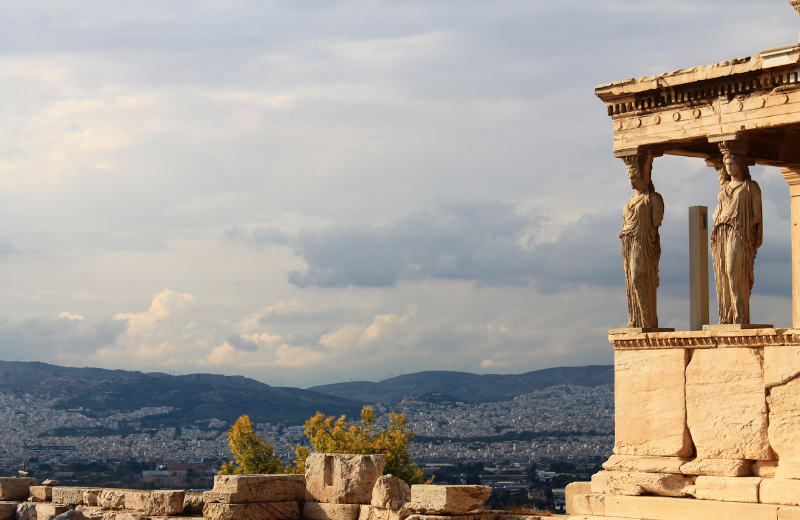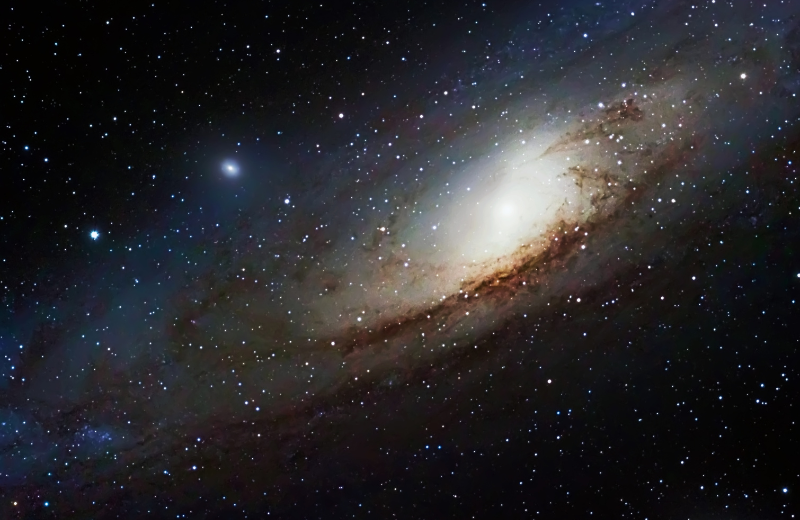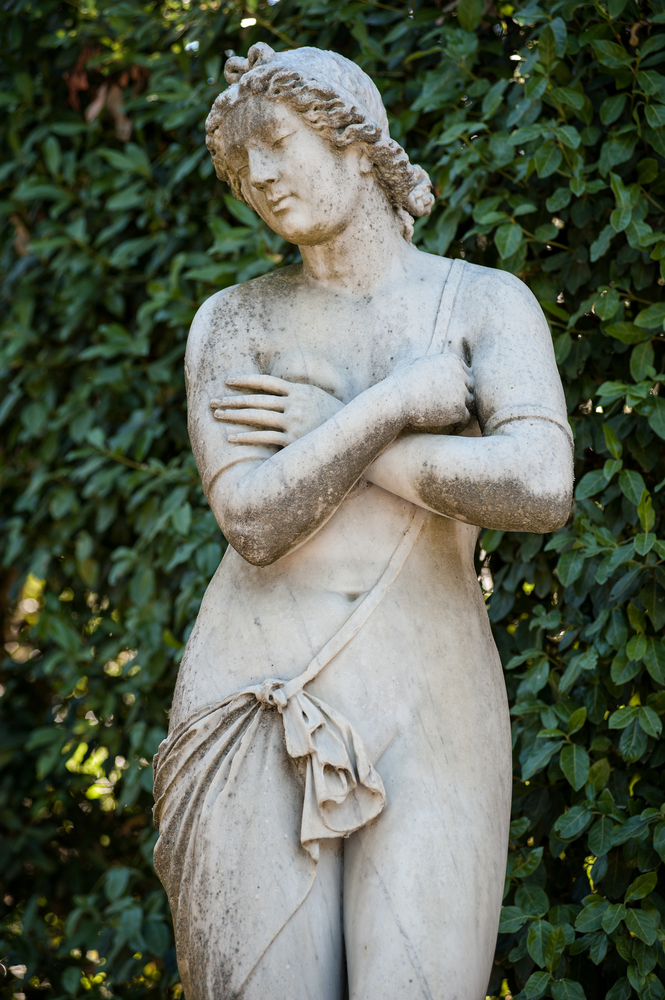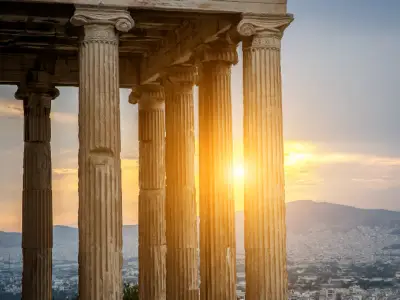If you’ve ever looked up at the night sky, you might have seen a constellation known as Andromeda, or perhaps you’ve heard of the stunning Andromeda Galaxy. But did you know that Andromeda’s origins stem from ancient Greek mythology, where she was a figure both celebrated and doomed? Her tale intertwines with heroism, sacrifice, and the gods themselves. Let's explore the story of Andromeda, her powers, symbols, and lasting legacy in mythology.
Jump to:
- Who is Andromeda in Greek Mythology?
- What is Andromeda the God of?
- The Myths and Legends of Andromeda
- The Symbols of Andromeda
- What Powers Does Andromeda Have?
- Andromeda's Relationships, Children, and Family Tree
- Andromeda's Worship and Legacy
- Andromeda's Lasting Impact on Art and Culture
- Frequently Asked Questions About Andromeda
- Study Greek Mythology for £29
Recommended for you!
Best SellersWho is Andromeda in Greek Mythology?
Andromeda is a central figure in Greek mythology, remembered for her beauty, her trials, and the legendary rescue by the hero Perseus. She was a princess, the daughter of King Cepheus and Queen Cassiopeia of Aethiopia (an ancient kingdom, not to be confused with modern Ethiopia). As the story goes, Andromeda’s life took a dark turn due to her mother’s vanity.
What is Andromeda the God of?

Although Andromeda herself was not a goddess, she was often regarded with respect due to her association with mythological figures and her place among the stars. In many ways, her story aligns with themes of fate, sacrifice, and heroism, where she is more of a passive victim rather than an active force. However, the Olympian gods’ involvement in her life elevates her status in mythology.
The Myths and Legends of Andromeda
The story of Andromeda is rich with mythology, filled with drama, divine interventions, and larger-than-life characters. Here are a few of the most significant myths associated with Andromeda and her place in Greek mythology.
Andromeda and the Sea Monster
The most famous legend of Andromeda revolves around her rescue. After being chained to a rock as a sacrifice to a sea monster, the hero Perseus, fresh from slaying the Gorgon Medusa, happened to be flying by. Upon seeing Andromeda in peril, he fell in love with her at first sight.
Using Medusa’s severed head, which could turn creatures to stone, Perseus defeated the monster and freed Andromeda. Andromeda and Perseus were married shortly after her rescue, and they went on to have several children, founding a royal dynasty. Interestingly, their story doesn’t end with their earthly lives; both Perseus and Andromeda were immortalised in the night sky as constellations.
Andromeda and Cassiopeia's Vanity
The origin of Andromeda’s plight begins with her mother, Queen Cassiopeia. Cassiopeia boasted that her daughter’s beauty surpassed that of the Nereids, the sea nymphs. This insult angered Poseidon, who sent a devastating sea monster to ravage the kingdom. The only way to appease the god of the sea was to sacrifice Andromeda. This myth emphasises the consequences of pride and vanity, not only for Cassiopeia but for Andromeda, who was caught in the crossfire.
Andromeda’s Constellation
After her death, the goddess Athena placed Andromeda in the sky as a constellation. According to the myth, Andromeda's image, chained to the rock, can be seen in the stars. Her place among the constellations ensures that her story is forever remembered, and she remains a prominent figure in both myth and astronomy. This celestial honour was a symbol of her endurance and the ultimate reward for her trials.
Perseus, Andromeda, and the Wedding Battle
Even after Andromeda was rescued by Perseus, her troubles were not entirely over. During their wedding, Andromeda’s former suitor, Phineus, attempted to claim her for himself. A fierce battle broke out at the wedding feast. Once again, Perseus used Medusa’s head to turn Phineus and his followers to stone, securing Andromeda’s future with him. This myth adds another layer of drama and danger to their love story, showcasing Perseus’ determination to protect his beloved.
The Symbols of Andromeda

In terms of symbols, Andromeda’s name and story are immortalised in the constellation that bears her name. Visible in the northern hemisphere, the Andromeda constellation represents her chained to the rock. It’s part of a larger mythological tapestry that includes the constellations of Perseus, Cassiopeia, and Cepheus.
Beyond the stars, Andromeda’s story is often depicted in art, with one of the most famous representations being Titian’s painting Perseus and Andromeda. This piece captures the dramatic moment of her rescue, with the hero Perseus facing off against the sea monster. The themes of love, beauty, and bravery often surround her imagery.
What Powers Does Andromeda Have?
Andromeda herself is not depicted as possessing godly powers, but her significance lies in her connection to powerful figures. In a way, her strength comes from her endurance and grace in the face of adversity.
While she might not wield lightning bolts or command the seas, her influence in mythology stems from the way she survives her trials. Andromeda’s ability to endure sacrifice, her role in shaping Perseus’ legend, and her place among the stars suggest that her power lies in the symbolism of survival and divine favour.
Andromeda's Relationships, Children, and Family Tree
Andromeda’s relationships in Greek mythology are integral to her story, linking her to prominent figures and a legacy that continues through her descendants.
- Parentage: Andromeda was the daughter of King Cepheus and Queen Cassiopeia of Aethiopia. Her mother's vanity set the events of her myth in motion, as Cassiopeia’s boast about Andromeda’s beauty led to Poseidon’s wrath and Andromeda’s near sacrifice.
- Husband: Andromeda's marriage to the hero Perseus is a key element of her story. After Perseus saved her from the sea monster, they wed and became a symbol of love and heroism in Greek mythology.
- Children: Together, Andromeda and Perseus had several children, the most notable being Perses, who is believed to have founded the Persian nation. Their other children are considered ancestors of significant Greek heroes, further solidifying Andromeda's influence in mythology.
- Connection to Hercules: Andromeda’s family tree extends to another famous hero, Hercules, through her marriage to Perseus. This connection ties Andromeda into the broader web of Greek mythology, linking her to heroic sagas and legendary figures.
Andromeda's Worship and Legacy

Though Andromeda was not widely worshipped like the gods, her legacy is evident in the lasting imagery and stories passed down through generations. Her myth inspired numerous works of art, literature, and eventually, the naming of the Andromeda Galaxy, the nearest spiral galaxy to our own Milky Way.
In the world of ancient astronomy, Andromeda's place in the sky is a reminder of her story. According to mythology, the goddess Athena placed Andromeda in the sky after her death as a reward for her suffering and endurance.
Andromeda's Lasting Impact on Art and Culture
Andromeda’s tale continues to inspire. In addition to paintings like Titian’s Perseus and Andromeda, the myth has been the subject of plays, poems, and sculptures throughout history. In many of these works, she is portrayed as a symbol of beauty and resilience, embodying the ideal of grace under pressure.
Her story also reaches into modern science, where the Andromeda Galaxy takes its name from the myth. This cosmic connection helps keep her legacy alive, serving as a reminder of her role in Greek mythology every time we look to the stars.
Recommended for you!
Best SellersFrequently Asked Questions About Andromeda
Why was Andromeda chained by the gods?
Andromeda was chained to a rock as a sacrifice to a sea monster sent by Poseidon. This punishment was inflicted after her mother, Queen Cassiopeia, boasted that Andromeda's beauty surpassed that of the Nereids, the sea nymphs. To appease Poseidon and save their kingdom, Andromeda was offered as a sacrifice.
Why did Perseus fall in love with Andromeda?
Perseus is said to have fallen in love with Andromeda at first sight. After witnessing her chained to the rock, awaiting her fate, Perseus was moved by her beauty and her plight. He rescued her by slaying the sea monster and later asked for her hand in marriage.
Did Andromeda and Perseus live happily ever after?
After their dramatic wedding battle where Perseus defended Andromeda from her former suitor Phineus, the two went on to live a long life together. They had several children, and their descendants became important figures in Greek mythology. Both Perseus and Andromeda were later immortalised in the stars as constellations.
What is the meaning of the name Andromeda?
The name Andromeda means "ruler of men" in Greek. This reflects her royal status as a princess and hints at the lasting legacy she left behind through her descendants and her place in the stars.
Who was jealous of Andromeda's beauty?
The Nereids, the sea nymphs, were indirectly jealous of Andromeda because of her mother Cassiopeia’s boast that Andromeda was more beautiful than they were. This angered Poseidon, who sent the sea monster as punishment for Cassiopeia’s vanity.
Study Greek Mythology for £29
If you're fascinated by Greek myths and the stories of gods, heroes, and legendary figures like Andromeda, why not explore further with the Greek Mythology Diploma Course at Centre of Excellence? For a limited time, you can access this course for just £29 – a brilliant opportunity to enrich your understanding of these timeless tales.













